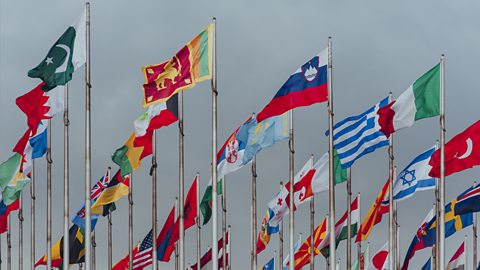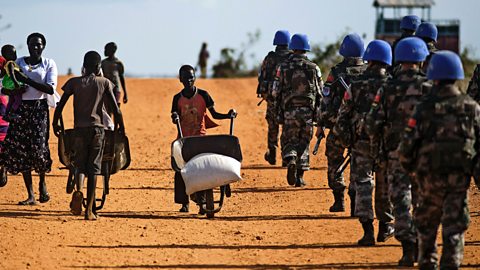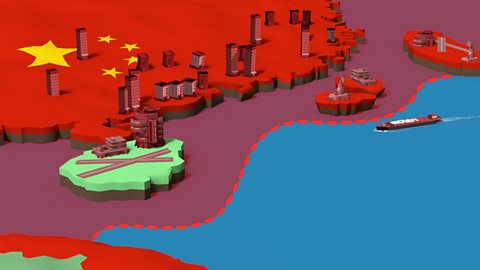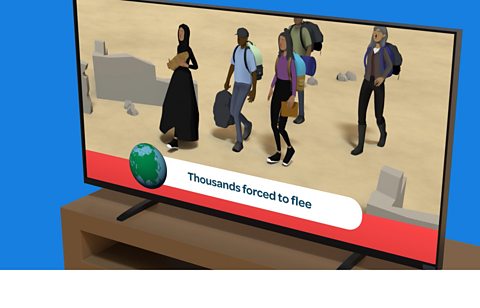What is the United Nations?
The United Nations (UN) is an international organisation founded in 1945. Its member countries have acted together to ensure global peace and security since the end of the Second World War. Its headquarters are in New York City.
The UN is responsible for international cooperation and, since its formation has set out several goals to ensure worldwide equality can be achieved.
Watch: The United Nations video
Watch this short clip to learn more about the work and aims of the United Nations.
We can’t overestimate the impact that conflict and war have had on our planet. Shifting borders, displacing populations. Changing our entire society. But since 1920, world governing bodies have attempted to do just that, replacing conflict with peace. It began with the League of Nations.
After the First World War, 42 countries came together, with one mission: to establish and maintain world peace. And all this, born out of the bloodiest conflict the world had ever seen. Spoiler alert: it wasn’t entirely successful. It’s called the First World War for a reason.
As the Second World War began, the League of Nations came to an end. But out of its ashes came another organisation, aiming to continue the mission. The United Nations. Its 51 original members have now swelled to a cool 193.
While the UN is a global organisation, it also operates on our very own doorstep. In Wales, projects funded by the UN have put Welsh classrooms in contact with classrooms from all over the world, spearheaded awareness campaigns on everything from global justice, to fair trade, to climate change and shipped volunteers from Wales to help with all sorts of projects in developing countries. Some of them even bring their own Welsh cakes. Tidy.
Elsewhere in the world, where people don’t quite get on as well as we do, the UN is best known for reducing conflict and war. Usually, this is done through its Security Council – a group of 15 of its most powerful and trusted members, charged with keeping the peace throughout the world! Since the Second World War, the UN is nearing a hundred peacekeeping missions, across Africa, Europe, Asia, The Americas, and the Middle East. Even when fighting does break out, the UN is there right after it ends, to make sure peace continues.This central mission - to keep the peace throughout the world - is one which not only crosses borders, but is common to all world religions, from Judaism to Christianity, Hinduism to Islam. No wonder the UN has so many friends.
If the UN has one aim above all others, it’s to secure a better future – through things like Sustainable Development Goals. It has 17 objectives - from ending world hunger to protecting aquatic life - and it brings nations together to tackle the problems facing the modern world. So while the United Nations was born out of conflict, most of its work is to do with the very opposite. Peace, prosperity, sustainability, equality and, whenever possible, Welsh cakes.
The San Francisco Conference and the UN Charter
Between April and June 1945, as the Second World War drew to a close, representatives from 50 countries met at the San Francisco Opera House to draw up the charterA formal statement which outlines the rules and guidelines, these are agreed to and signed by each member of the United Nations.
It established the primary purpose, governing structure and overall framework of the United Nations.
On 26 June 1945, the charter was signed by the representatives of the 50 countries involved. It didn’t come into force until 24 October 1945, when the terms of the charter were to ratifyTo agree to a treaty or contract, making it official. This is the date now celebrated as United Nations Day.
Members of the United Nations
There were 51 members when the UN was founded, after Poland was allowed to join in October 1945. Since then, it has grown considerably and as of 2021, it has 193 member states.
The UN's Security CouncilA group of 15 member countries who determine the existence of a threat to peace or act of aggression has responsibility for international peace and security. It has 15 members, five of whom have permanent seats:
- United Kingdom
- United States of America
- China
- France
- Russia (who took the Soviet Union’s seat in 1991)

The aims of the United Nations
Since it was established, the United Nations has always set targets and goals for each of its members to meet and uphold.
The most recent goals set by the UN include the Sustainable Development Goals. These were introduced in 2015 with the intention of securing the UN’s long-lasting goals of peace and security, with an added emphasis on being more sustainable and ensuring countries are actively thinking of tackling matters such as climate change.
The 17 Sustainable Development Goals are:
- No poverty
- Zero hunger
- Good health and wellbeing
- Quality education
- Gender equality
- Clean water and sanitation
- Affordable and clean energy
- Decent work and economic growth
- Industry, innovation and infrastructure
- Reduced inequality
- Sustainable cities and communities
- Responsible consumption and production
- Climate action
- Life below water
- Life on land
- Peace, justice and strong institutions
- Partnerships
Source:
UN Peacekeeping projects - South Sudan
The United Nations has conducted over 70 peacekeeping missions since 1948.
South Sudan gained independence from the Republic of Sudan in 2011, making it the most recently formed country in the UN (as of 2021) and its 193rd member. Since its formation, the country has been plagued by endless civil wars and conflict.
On 8 July 2011, the UN’s Security Council decided that the situation in South Sudan presented a threat to international peace and security in the region. The United Nations Mission in South Sudan (UNMISS) was established as a peacekeeping initiative to maintain peace and reduce conflict in the country.
The UNMISS set key areas to address whilst aiding South Sudan which included:
- ensuring the country has the support it needs for peace and can work on longer-term state building and economic development
- supporting the government with its responsibilities for addressing conflict and protecting its people
- supporting the government in developing its capacity to provide security, establish the rule of law, and to strengthen security and justice within the country
The UN would not be able to undertake these missions without the help of its member states. Many countries from across the world have contributed soldiers and police personnel to help maintain peace in South Sudan. A majority of these come from countries such as Rwanda, Nepal, Ethiopia and India.

Signing a new peace agreement in 2018, and having a government of national unity in place, reduced the level of political violence across the country. UN Protection Sites, which were built to protect those in imminent danger during intense conflict, were gradually redesignated as more conventional camps for those people who had been displaced.

More on Conflict and peace
Find out more by working through a topic
- count2 of 3

- count3 of 3
